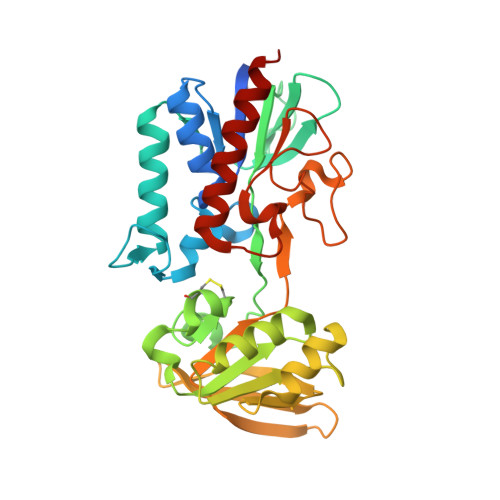Insights into the specificity of thioredoxin reductase-thioredoxin interactions. A structural and functional investigation of the yeast thioredoxin system.
Oliveira, M.A., Discola, K.F., Alves, S.V., Medrano, F.J., Guimaraes, B.G., Netto, L.E.(2010) Biochemistry 49: 3317-3326
- PubMed: 20235561
- DOI: https://doi.org/10.1021/bi901962p
- Primary Citation of Related Structures:
3ITJ - PubMed Abstract:
The enzymatic activity of thioredoxin reductase enzymes is endowed by at least two redox centers: a flavin and a dithiol/disulfide CXXC motif. The interaction between thioredoxin reductase and thioredoxin is generally species-specific, but the molecular aspects related to this phenomenon remain elusive. Here, we investigated the yeast cytosolic thioredoxin system, which is composed of NADPH, thioredoxin reductase (ScTrxR1), and thioredoxin 1 (ScTrx1) or thioredoxin 2 (ScTrx2). We showed that ScTrxR1 was able to efficiently reduce yeast thioredoxins (mitochondrial and cytosolic) but failed to reduce the human and Escherichia coli thioredoxin counterparts. To gain insights into this specificity, the crystallographic structure of oxidized ScTrxR1 was solved at 2.4 A resolution. The protein topology of the redox centers indicated the necessity of a large structural rearrangement for FAD and thioredoxin reduction using NADPH. Therefore, we modeled a large structural rotation between the two ScTrxR1 domains (based on the previously described crystal structure, PDB code 1F6M ). Employing diverse approaches including enzymatic assays, site-directed mutagenesis, amino acid sequence alignment, and structure comparisons, insights were obtained about the features involved in the species-specificity phenomenon, such as complementary electronic parameters between the surfaces of ScTrxR1 and yeast thioredoxin enzymes and loops and residues (such as Ser(72) in ScTrx2). Finally, structural comparisons and amino acid alignments led us to propose a new classification that includes a larger number of enzymes with thioredoxin reductase activity, neglected in the low/high molecular weight classification.
Organizational Affiliation:
Departamento de Biologia, Universidade Estadual Paulista, S?o Vicente, Brazil.


















